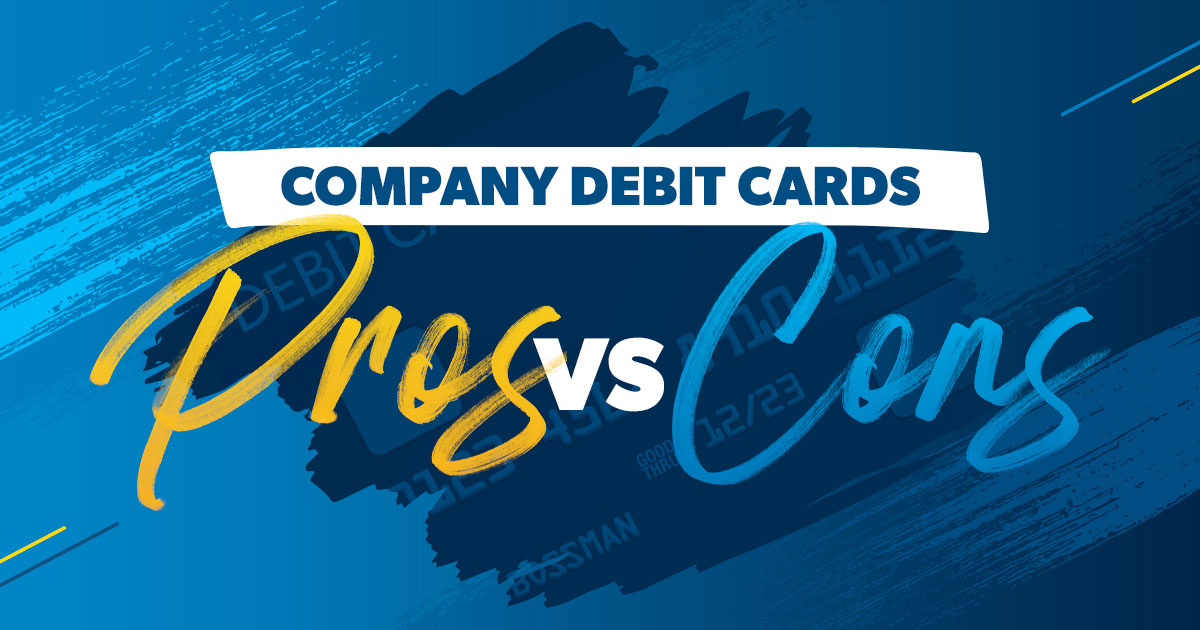
There are a trillion decisions to make as a business owner, each one just as important as the next. Things like how to create a budget, what position you need to hire next, and whether or not you should give your employees a company debit card. Is your head spinning yet? Listen: You don’t have to make your business decisions in a vacuum. In fact, we might be able to help—especially when it comes to that company debit card.
What Is a Company Debit Card?
A company debit card is exactly what it sounds like . . . a debit card for business purposes only. It’s a bank card connected to your business’s bank account. And just like your personal debit card, you can only spend what you have in the account—to the penny.
Pros of Using a Company Debit Card
If you’ve been hanging around with us for a while, you know we love debit cards, especially as an alternative to credit cards. And a business card is no different. Here are some pros of using a debit card for your business:
1. No borrowing . . . at all.
The money you spend is yours. You don’t have to worry about paying someone else back or owing anyone else a dime.
2. No interest rates or lines of credit.
That’s right. With a company debit card, what you spend is what you spend. And you don’t have to pay interest on your own hard-earned money.
3. There’s no such thing as overspending.
When the last penny is gone, it’s gone. And while it’s uncomfortable to see zero in that bank account, it’s better than using money that isn’t yours to begin with.
Cons of Using a Company Debit Card
There’s a positive and a negative to most things, but it also depends on who you listen to and if you’re a fan of credit cards. But there are some drawbacks you’ll need to keep a close eye on if you go this route:
1. When the money is gone, it’s gone.
There’s no safety net when it comes to your checking account. If your employee goes on an unexpected spending spree, they could end up draining your bank account. (This is why hiring people you can trust is a really good idea.)
2. If someone steals your card, your own money is at stake.
Most debit cards are backed by major players like Visa and Mastercard. If you report a stolen card or fraudulent behavior right away, you’re likely covered by their zero liability policy.1 Otherwise, you’re at the mercy of your bank to sort through the mess.
3. Your employees have direct access to your business funds.
This is either a positive or a negative, depending on how you look at it. Either way, you’ll want to make sure there are strict rules on how your employees use the card.
Should I Give My Employees a Debit Card?
“If you trust this person enough to work for you, you should be able to trust them to hold a debit card.” — Dave Ramsey
Like Dave said, giving your employee a debit card depends on how much trust you have with them. If you’re a 1,000-person operation, you probably don’t need to give all 1,000 employees keys to the bank vault. But that doesn’t mean you shouldn’t trust them to make good spending decisions on your company’s behalf.
You probably thought running a business sounded fun—until you realized it would actually run you. Discover the EntreLeadership System—the small-business road map that takes the guesswork out of growth.
The answer comes in the form of setting spending limits and being clear about your boundaries. To be unclear is to be unkind. So if you’re opting to let your staff use the company debit card, you also need to clearly tell them what your expectations are.
Spending Limits
With debit cards, you can choose to set a daily spending limit. Many banks already have a daily spending limit set (ex. $5,000), but you can choose to set it at the limit you feel most comfortable with.
Spending Do’s and Don’ts
Like we said earlier, to be unclear is to be unkind. If you’re handing out company debit cards to certain employees, you need to be clear on the do’s and don’ts of how they use the card. For instance, let them know what kinds of purchases are okay for the company and what’s not. Do they need to keep their purchase receipts for the accountant? What happens if they overspend or break your trust? Lay it all out openly and clearly so there’s no confusion along the way.
Spending Ethics
Giving your card-holding employees boundaries might seem like a no-brainer. But what about moral and ethical decisions that go along with a company card? You’ll need to think through things like:
- What happens if an employee forgets their own personal card and uses the company card for a purchase?
- Are they allowed to take a new co-worker out to lunch or coffee on the company dime?
- What happens if an employee treats themselves to coffee during work hours?
There are a lot more what-if scenarios where those came from, but you get the idea. Trusting your employee to make the right decisions is a good start, but laying out the correct usage of the card completes the bigger picture.
The good news? Even if you’re running the business on your own and are a one-man (or one-woman) show, you still need to set good money-spending policies. And when you decide to hire, you’ll already be set up to help your employee succeed. But you don’t have to do business alone. Get a customized plan and online leadership coaching for your business with EntreLeadership Elite. You’ll be running your successful business with confidence in no time.

